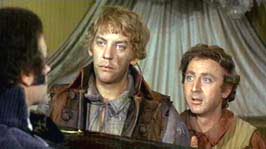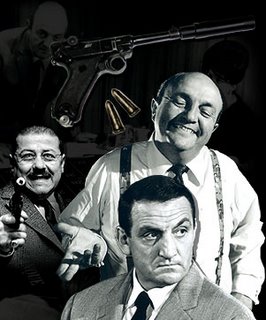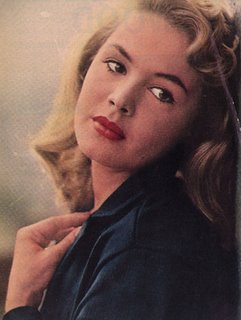The screenplay was written by Preston Sturges, but this is a sentimental romance, not one of his trademark farces. Biographer Donald Spoto says Remember the Night was written soon after Sturges's marriage (his second of four, but a honeymoon's a honeymoon), and it carries the gleam of newfound love. Barbara Stanwyck plays a shoplifter arrested just before Christmas. Fred MacMurray is the assistant D.A. who must prosecute her, a tall order since juries are inclined to be lenient around the holidays. MacMurray executes a deft courtroom maneuver and gets a continuance, meaning Stanwyck's fate won't be decided until after the holidays. But his conscience bothers him when he overhears her lamenting that she can't make bail, and so will spend Christmas in jail. He bails her out, only to have the bondsman deposit her in his apartment even as he prepares to go home to Mom in Indiana. Turns out that Stanwyck, too, is from Indiana, and MacMurray decides to take her along for the drive.
 MacMurray has been dissed a bit lately, by Dave Kehr and the estimable Looker, but the Siren disagrees. He was the least starry of leading men, and that was the whole point. His good looks are of the sort you might encounter in any office. When he turns on the charm, he's no more or less resistible than that boy you used to date in college. His characters telegraph jokes like a kid brother does, with a little grin at his own cleverness (a technique that reached its apogee in Double Indemnity, as Walter Neff registers self-congratulation with every double-entendre). That everyday quality meant MacMurray gives the audience the chance to recognize itself, something that is harder to do when looking at, say, Cary Grant. When MacMurray decides to bail out Stanwyck, instead of seeing only a wildly improbable plot twist, you see the kind of reluctant, I-don't-need-the-guilt charity we all are prey to at the holidays.
MacMurray has been dissed a bit lately, by Dave Kehr and the estimable Looker, but the Siren disagrees. He was the least starry of leading men, and that was the whole point. His good looks are of the sort you might encounter in any office. When he turns on the charm, he's no more or less resistible than that boy you used to date in college. His characters telegraph jokes like a kid brother does, with a little grin at his own cleverness (a technique that reached its apogee in Double Indemnity, as Walter Neff registers self-congratulation with every double-entendre). That everyday quality meant MacMurray gives the audience the chance to recognize itself, something that is harder to do when looking at, say, Cary Grant. When MacMurray decides to bail out Stanwyck, instead of seeing only a wildly improbable plot twist, you see the kind of reluctant, I-don't-need-the-guilt charity we all are prey to at the holidays. Stanwyck, as usual, is marvelous. In the courtroom scene, see her watch a hambone lawyer (Willard Robertson) spin an absurd theory of how self-hypnosis lured her into unintentional theft. Stanwyck's reaction shots start out demure, but none too optimistic. As the jury starts to buy all that lawyerly hokum, her posture improves, her eyes start to sparkle. She tries to maintain a look of contrition, while she eases her gorgeous legs a little more into the jury's sightlines.
Stanwyck, as usual, is marvelous. In the courtroom scene, see her watch a hambone lawyer (Willard Robertson) spin an absurd theory of how self-hypnosis lured her into unintentional theft. Stanwyck's reaction shots start out demure, but none too optimistic. As the jury starts to buy all that lawyerly hokum, her posture improves, her eyes start to sparkle. She tries to maintain a look of contrition, while she eases her gorgeous legs a little more into the jury's sightlines.Because Stanwyck is too smart to milk the audience for sympathy, she wins it early on. MacMurray takes her to dinner after bailing her out (come on, it's a Christmas movie, suspend that disbelief) and, as a band plays "Easy Living," the title tune from an earlier Sturges-Leisen collaboration, she summarizes her life of crime. MacMurray, already succumbing a bit, half-jokingly suggests kleptomania as a defense. Won't work, says Stanwyck, as though revealing a trade secret: "You can't try to sell the stuff afterward, or you lose your amateur status."
The Indiana the characters reach, after some slapstick road diversions, has two sides, which together give Remember the Night its heart. Stanwyck's town comes first; as they drive down the Grover's Corners streets, her expression changes from eager nostalgia, to fear of what is coming next. Her house is a gingerbread Victorian, looming over the yard like a mausoleum, without a single light in the window. Here, Stanwyck tries to make up with the grimmest old meat-axe of a mother in the history of Christmas movies. The alternate-universe Beulah Bondi in It's a Wonderful Life has nothing on Georgia Caine here. The recriminations start right away, and you see that Stanwyck the shoplifter was just living down to expectations. MacMurray stands to one side, trying to stay out of it until, in a perfectly modulated moment, he tells Stanwyck they still have 50 miles to drive to his farm. No rescue was ever so low-key, and few are as endearing.
 So they arrive at the farm, and whaddya know, MacMurray's mom IS Beulah Bondi. But it's the nice version, thank goodness. The rest of the movie chronicles the change in Stanwyck as Christmas shows her what family life can be like, and the change in MacMurray, as he falls in love with the shoplifter he's scheduled to put away. Both of them must decide what to do when they return to New York, and the trial. The fuss made there over Stanwyck's crime may seem more appropriate to Brigid O'Shaughnessy going down in The Maltese Falcon than a simple bracelet heist, but it still makes for a beautiful fadeout.
So they arrive at the farm, and whaddya know, MacMurray's mom IS Beulah Bondi. But it's the nice version, thank goodness. The rest of the movie chronicles the change in Stanwyck as Christmas shows her what family life can be like, and the change in MacMurray, as he falls in love with the shoplifter he's scheduled to put away. Both of them must decide what to do when they return to New York, and the trial. The fuss made there over Stanwyck's crime may seem more appropriate to Brigid O'Shaughnessy going down in The Maltese Falcon than a simple bracelet heist, but it still makes for a beautiful fadeout.Nobody's all good, or all bad, not in my movies at least. There's a little bad in the best of us, and a little good in the worst of us.
--Mitchell Leisen, quoted in an appreciation at the indispensable Senses of Cinema site.
Mitchell Leisen, who started out as a set decorator, was not beloved by his two most gifted screenwriters, Sturges and Billy Wilder. Sturges always maintained Leisen ruined the script for Easy Living. (This makes the Siren wonder just how much more perfect that priceless screwball comedy was supposed to be.) "A window dresser," was Wilder's kindest assessment; when recalling an incident on Hold Back the Dawn he lapsed into slurs on Leisen's homosexuality. Wilder biographer Ed Sikov says his subject was always too hard on Leisen, but then turns around and says Leisen didn't do much more for screenplays than "record them on celluloid and make sure the lighting was good."
Phooey, says the Siren. It isn't merely lighting that makes a moment like MacMurray and Stanwyck on the porch of her childhood home. As he tries to comfort her, over his shoulder you see the mother at the door, pausing for a moment--to hurl one last insult? to see if they're leaving?--then shutting off the lights. At MacMurray's farm, there's the way the canopy in her bedroom arcs over Stanwyck's face like a bridal veil, or the way the camera hovers over a barn dance and still manages to let you pick out the couple, Stanwyck happily blending in as she never did before in Indiana.
Remember the Night's chief flaw, in the Siren's eyes, is yet another of those comical African-American servants that pockmark Sturges's movies. "I loved this movie," says one Amazon reviewer. "That's a hard statement for a black man to make about any movie in which Snowflake has a role." But beloved the film is and remains, gaining all kinds of admirers as the years go by. A film that can do that must have a great deal of the true Christmas spirit.
And in that spirit, the Siren wishes her patient readers the happiest of holidays.



























